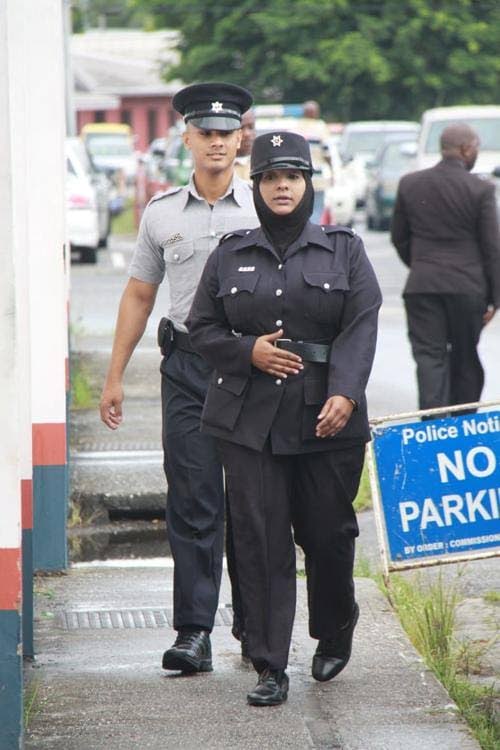Compensation for hijab-wearing cop

A year after she won the right to wear a hijab while on duty, a special reserve policewoman will receive $185,000 in compensatory damages for the breaches to her constitutional right to freedom of religion.
Constable Sharon Roop was denied her request to wear her headdress by former police commissioner Stephen Williams.
On Tuesday, Justice Margaret Mohammed, who on November 9, last year ruled in Roop’s favour, yesterday gave her assessment of the compensation the policewoman should receive.
Roop’s attorneys Anand Ramlogan, SC, Alvin Pariagsingh and Che Dindial argued that she ought to be compensated for emotional distress, pain, anguish and severe inconvenience she underwent as a result of the prolonged and systemic discrimination in the police service.
They also argued that she was subjected to a stoic and, at times, brutal disregard of her rights as evidenced by a vctimisation and smear campaign designed to silence her request, which she made a little over four years ago, when she began wearing the hijab.
Roop is based at the Central Operations Centre at the Chaguanas Police Station as a wireless operator.
In her assessment, Mohammed said she did not agree with the State’s contention that it was sufficient vindication of her breached rights that Roop was allowed to wear the hijab with her police uniform after the court's declaration.
She pointed out that former commissioner Williams had no choice, since failure to comply with the court’s ruling would have been a contempt of the court. She said it was not as if Roop was allowed to wear the hijab shortly after she raised the issue with him in 2015.
“She had to wait for three years to do so,” the judge said. “This is an important constitutional right in the multi-religious society of TT. The issue of how any official, public, in this case the commissioner, or private, treats with the allegation of discrimination on the basis of religion is a matter of public interest.”
Mohammed added that people who work, live and do business ought not to merely pay lip service to the words of the national anthem: “Here every creed and race find an equal place.”
“They are words which are to remind people of TT, on a daily basis, of the type of society which citizens are continue to strive to maintain. Indeed, a society is judged not on how it treats with the majority by the protection given to the minority,” Mohammed said in her assessment.
She noted that her assessment must reflect “some sense of outrage” at the insensitive, careless manner in which Williams treated with Roop’s complaint. She pointed out that he was aware of other religious adornments worn by police, such as rakshasas (by Hindus) and crosses (by Christians), adding that the police service appeared to be tolerant towards other religions to some extent, despite the stand of religious neutrality which it took in Roop’s case.
Mohammed said it was not surprising that Williams said he met the police regulations, which dictate the mode of dress for police officers on duty, but added that he did nothing to address the discriminatory portions of it. Instead, she said he sought to actively defend the discriminatory policy on the basis of religious neutrality.
“The police service and all organisations in TT, both public and private, must be deterred from implementing, maintaining and enforcing work uniforms which fail to pay regard to the constitutional right to freedom of conscience and to religious belief.
“In my opinion, the purpose for a uniform either at school or at work is laudable. However, it cannot be designed, implemented and used as a tool to infringe a person’s rights, since TT is not a religious neutral society,” the judge added.
She also said she was awarding compensatory and vindicatory damages to Roop because her case did not have to come to court.
The State was represented by attorneys Tinuke Gibbons-Glenn, Stefan Jaikaran, Candice Alexander and Svetlan Dass.


Comments
"Compensation for hijab-wearing cop"